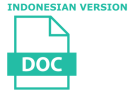Code Mixing in the Lyrics of the Song “You Never Know” by Blackpink
Suwiyah Suwiyah(1), Adhan Kholis(2*)
(1) Universitas Nahdlatul Ulama Yogyakarta
(2) Universitas Nahdlatul Ulama Yogyakarta
(*) Corresponding Author
Abstract
This research was a study of language code mixing contained in the lyrics of a song titled “You Never Know” by Blackpink. This study aimed to identify the forms of code mixing contained in the lyrics of the song you never know by black pink, identify the types of code mixing used in the song lyrics, and describe the source language of the code mixing contained in the lyrics of the song. The method used in this study was content analysis, which was a qualitatively oriented technique, usually used to determine the character of documents or to compare them. The conclusion obtained from this study was the forms of code mixing contained in the lyrics of the song You Never Know by Blackpink consisting of inserting words, phrases and clauses. Code mixing in the form of words totaling 8 data, phrases totaling 20 data and clauses totaling 10 data. The type of code mixing used in the lyrics of the song you never know by Blackpink was alternation code mixing. The outer code mixing used was 8 data. The source language contained in the lyrics of the song You Never Know by Blackpink came from English and Korean. The code-mixed from English language was 26 data and Korean was 44 data. Through this research, it can be suggested that further researchers can be developed with the theory of code switching which is closely related to code switching.
Keywords
Full Text:
PDFReferences
Ardiyanti, D., & Setyorini, R. (2018). Analisis Campur Kode pada Lirik Lagu Jaran Goyang Dipopulerkan oleh Nella Kharisma. SAP (Susunan Artikel Pendidikan), 2(3). Bungin, Burhan. (2011). Penelitian Kualitatif. Jakarta: Kencana Predana Media Group Dwiyota, S. (2018). The use of code mixing in tweets by kpop fans in Twitter. LINGUA LITERA: journal of english linguistics and literature, 3(1), 31-40. Hutauruk, M., & Erlangga, D. T. (2022). Analysis Of Black Pink Songs' lyrics Using Code Mixing. Ibrahim, H. Bachtiar. (1993). Rencana Dan Estimate Real of Cost. Cetakan ke-2. Jakarta: Bumi Aksara. J. Moleong, Lexy. (2014). Metode Penelitian Kualitatif, Edisi Revisi. PT Remaja Rosdakarya, Bandung Koentjaraningrat. (2004). Kebudayaan, Mentalitas dan Pembangunan. Jakarta: PT. Gramedia Pustaka Utama. Luthfia, A., & Puspitasari, D. (2020). Campur Kode dalam Album Jepang “Blackpink in Your Area” milik Blackpink (Doctoral dissertation, Universitas Brawijaya). Luthfiyani, F. (2014). Code switching and code mixing on korean television music show after school club. Mulyati, S., Astuti, P. I., Arianti, A., & Noviana, A. (2021). Code Mixing Strategies in BLACKPINK’s Album. ASELS_2021. Muysken, (2000). Bilingual Speech a typology of Code-Mixing. Cambridge University Press. UK Nababan, P.W.J. (1991). Sosiolinguistik Suatu Pengantar. Jakarta: PT Gramedia Pustaka Utama Pradnyamita, K. N. (2023). Analysis of Code Mixing in the Lyrics of the Song'Boys Meet You'. Educationist: Journal of Educational and Cultural Studies, 1(3), 269-279 Praptiningsih, M. (2020). Analisis Campur Kode dalam Lirik Lagu Love Me Right~ Romantic Universe~ Oleh Exo (Doctoral dissertation, Universitas Sumatera Utara). Setiadi, D. (2017). Campur Kode Dalam Lirik Lagu “Kis Band”. RETORIKA: Jurnal Ilmu Bahasa, 3(1), 1-15. Suwito. (1985). Sosiolinguistik. Surakarta: Henary Offset WATI, G. S. (2022). Alih Kode Dan Campur Kode Dalam Program ‘24/365 With Blackpink’di Youtube: Analisis Sosiolinguistik (Doctoral dissertation, Universitas Nasional).
Article Metrics
Refbacks
- There are currently no refbacks.
Copyright (c) 2024 JLA

This work is licensed under a Creative Commons Attribution-ShareAlike 4.0 International License.








